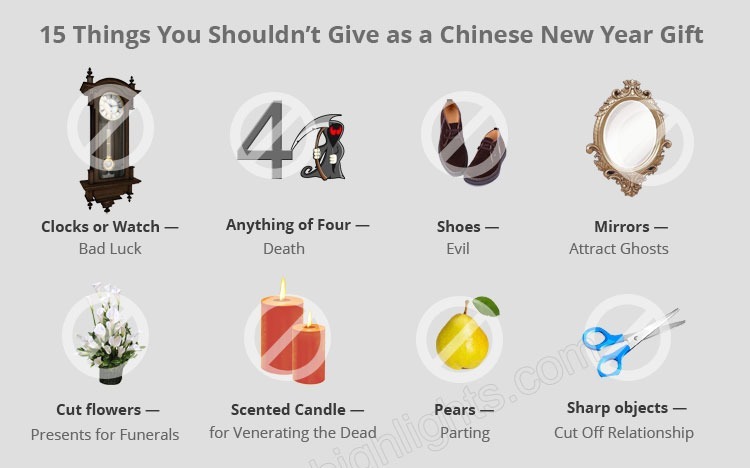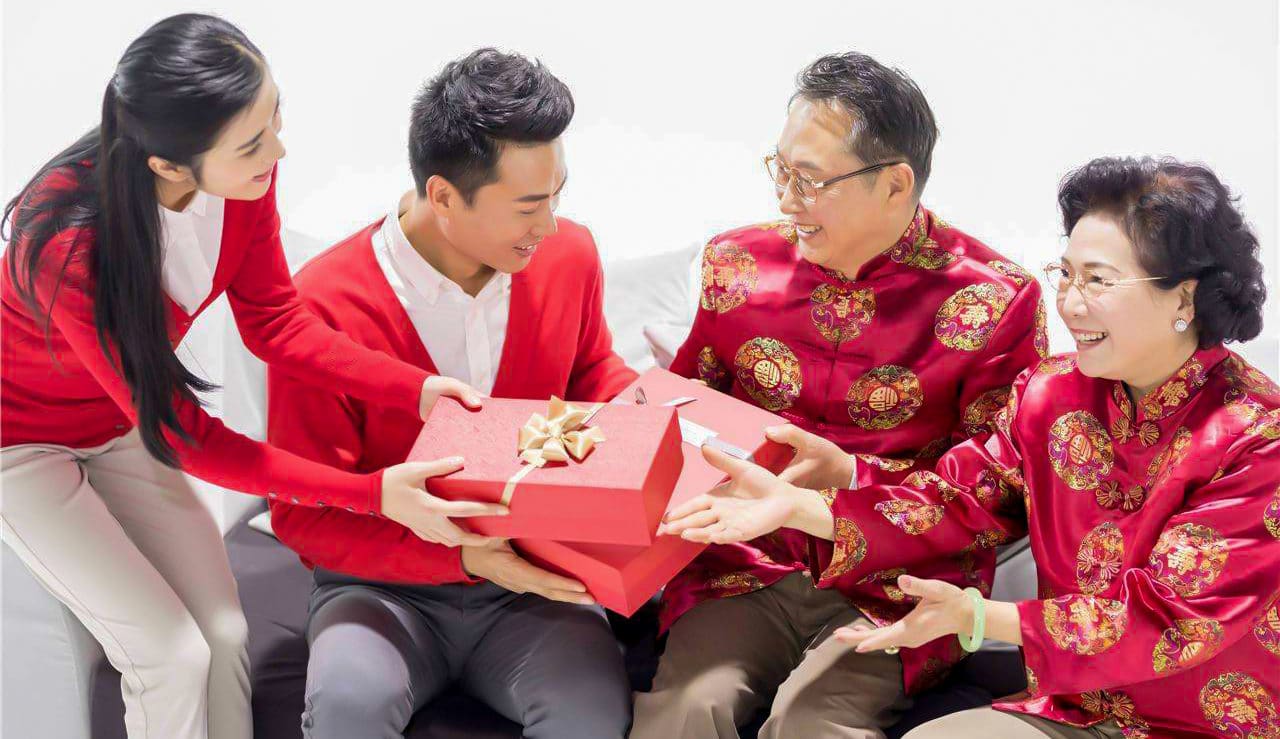What to Avoid When Giving Gifts in China
Gift-giving in China is a deeply rooted tradition that reflects respect, gratitude, and social harmony. However, cultural nuances mean certain gifts can unintentionally offend or convey the wrong message. Understanding what to avoid is essential to ensure your gesture is well-received. For instance, items like clocks, handkerchiefs, or sharp objects carry negative connotations in Chinese culture, often symbolizing loss or severed relationships. Similarly, wrapping gifts in white or black paper may evoke funerary associations. Even the number of items or how they’re presented can matter. By steering clear of these pitfalls, you’ll show cultural sensitivity and strengthen your personal or professional connections in China.
What to Avoid When Giving Gifts in China
1. Avoid Giving Clocks or Watches
In Chinese culture, giving a clock or watch as a gift is highly inappropriate because the phrase giving a clock (送钟 sòng zhōng) sounds like attending a funeral (送终 sòng zhōng). This association with death makes it a taboo gift. Instead, opt for items like tea, fruit, or high-quality alcohol to show appreciation.
| Gift to Avoid | Reason | Alternative Gift |
|---|---|---|
| Clocks/Watches | Sounds like attending a funeral | Tea, Fruit, Alcohol |
2. Steer Clear of Sharp Objects
Gifting knives, scissors, or other sharp objects symbolizes cutting ties or ending a relationship in Chinese culture. This makes them a poor choice for gifts, especially in business or personal relationships. Instead, consider luxury pens or decorative items as safer alternatives.
See AlsoLearning Chinese is easier than you think| Gift to Avoid | Reason | Alternative Gift |
|---|---|---|
| Knives/Scissors | Symbolizes cutting ties | Luxury Pens, Decorative Items |
3. Don’t Give White or Black Wrapped Gifts
In China, white and black are colors traditionally associated with mourning and funerals. Wrapping gifts in these colors can be seen as insensitive or bad luck. Instead, use red or gold wrapping paper, as these colors symbolize prosperity and happiness.
| Color to Avoid | Reason | Preferred Color |
|---|---|---|
| White/Black | Associated with mourning | Red/Gold |
4. Avoid Gifts in Sets of Four
The number four (四 sì) sounds like the word for death (死 sǐ) in Chinese, making it extremely unlucky. Avoid giving gifts in sets of four, such as four cups or four items. Instead, choose even numbers like six or eight, which are considered auspicious.
| Number to Avoid | Reason | Lucky Number |
|---|---|---|
| Four | Sounds like death | Six or Eight |
5. Never Give an Empty Wallet or Purse
Gifting an empty wallet or purse symbolizes financial loss or poverty. To avoid this negative connotation, always place a small amount of money inside the wallet before giving it. This gesture represents wealth and prosperity for the recipient.
See AlsoLearning Chinese as a beginner| Gift to Avoid | Reason | Solution |
|---|---|---|
| Empty Wallet/Purse | Symbolizes poverty | Add money inside |
What should you not give as a gift in Chinese culture?

Clocks as Gifts
Giving clocks as gifts is highly discouraged in Chinese culture due to their symbolic association with death and funerals. The phrase giving a clock (送钟 sòng zhōng) sounds similar to attending a funeral (送终 sòng zhōng), making it an unlucky present.
- Symbolism: Clocks represent the countdown to death.
- Cultural taboo: Often given at funerals, not celebrations.
- Alternative: Opt for timeless items like art or tea instead.
Sharp objects, such as knives or scissors, symbolize cutting ties or severing relationships, which is considered bad luck in Chinese culture.
See AlsoIf you want to master Chinese, make long-term investments- Negative meaning: Represents the end of a friendship or bond.
- Superstition: Believed to bring conflict or misfortune.
- Exception: If given as part of a tradition (e.g., wedding scissors), include a coin to pay for it and neutralize the bad luck.
Handkerchiefs or Towels
Handkerchiefs and towels are associated with funerals and goodbyes, making them inappropriate gifts for happy occasions.
- Funeral link: Often distributed at memorial services.
- Symbolism: Suggests wiping away tears or parting ways.
- Alternative: Choose decorative items or practical gifts without negative connotations.
Umbrellas as Gifts
Gifting an umbrella is frowned upon because the word for umbrella (伞 sǎn) sounds like to separate (散 sàn), implying a broken relationship.
- Linguistic taboo: Homophone for separation or breakup.
- Cultural belief: Thought to bring bad luck to friendships or romances.
- Workaround: If unavoidable, the recipient can buy it with a small coin to negate the superstition.
Pears or Sharing a Pear
Pears are avoided as gifts because the word for pear (梨 lí) sounds like to part (离 lí), symbolizing separation or divorce.
See AlsoHow to figure out how good your Chinese is- Phonetic issue: Pronunciation resembles parting ways.
- Romantic caution: Particularly avoided for couples to prevent breakup symbolism.
- Alternative fruits: Oranges or apples symbolize luck and harmony instead.
Which of the following should you avoid giving as a gift in China?

Why Should You Avoid Giving Clocks as Gifts in China?
In Chinese culture, giving a clock as a gift is highly inappropriate because the phrase giving a clock (送钟 sòng zhōng) sounds like attending a funeral (送终 sòng zhōng). It symbolizes death and is considered bad luck. Here are key reasons to avoid it:
- Cultural superstition: Clocks are associated with counting down to one's lifespan.
- Funeral connotations: They are often linked to memorial services.
- Offensive implication: The recipient may interpret it as wishing them harm.
Why Are Sharp Objects Like Knives or Scissors Bad Gifts in China?
Gifting sharp objects such as knives or scissors symbolizes cutting ties or severing relationships, which is considered unlucky. Here’s why:
See AlsoWhat Is A Friends Clash On Duolingo: A complete guide- Symbolic meaning: Represents the end of a friendship or bond.
- Negative energy: Sharp items are believed to bring conflict.
- Alternative practice: If given, the recipient may pay a small token (like a coin) to neutralize the bad luck.
Why Should You Avoid Giving Handkerchiefs in China?
Handkerchiefs are associated with goodbyes or parting ways, making them a poor gift choice. Key reasons include:
- Funeral tradition: They are used to wipe tears during mourning.
- Separation symbolism: Implies the end of a relationship.
- Cultural taboo: Seen as inviting sadness or loss.
Why Is Giving Umbrellas Considered Unlucky in China?
The word for umbrella (伞 sǎn) sounds like to separate (散 sàn), making it an unfortunate gift. Reasons to avoid it:
- Linguistic association: Symbolizes breaking apart or divorce.
- Negative superstition: Believed to bring discord in relationships.
- Practical irony: Even though useful, it carries unwanted meanings.
Why Are White or Black Flowers Inappropriate Gifts in China?
White and black flowers, especially chrysanthemums, are tied to funerals and mourning. Avoid them because:
- Funeral flowers: White symbolizes death, while black represents misfortune.
- Cultural context: Chrysanthemums are common at gravesites.
- Alternative colors: Red or pink flowers are safer and symbolize joy.
What is the Chinese gifting taboo?

Gifts to Avoid in Chinese Culture
In Chinese culture, certain gifts are considered inappropriate or even offensive due to their symbolic meanings or linguistic associations. Here are some key examples:
- Clocks: The phrase giving a clock (送钟, sòng zhōng) sounds like attending a funeral (送终), making it a symbol of death.
- Sharp Objects: Knives or scissors symbolize cutting ties or severing relationships, which is undesirable.
- Handkerchiefs: Associated with funerals and parting ways, they are seen as unlucky.
Unlucky Colors for Gift Wrapping
Color symbolism plays a significant role in Chinese gifting etiquette. Certain colors should be avoided to prevent conveying negative messages:
- White: Represents mourning and is traditionally used in funerals.
- Black: Symbolizes misfortune and is also linked to death.
- Blue: Occasionally avoided as it can signify coldness or sadness.
Numbers to Avoid in Gifting
Numbers hold deep cultural significance in China, and some are considered unlucky when associated with gifts:
- Number 4: Sounds like death (死, sǐ) in Chinese, making it highly taboo.
- Odd Numbers: Generally avoided (except for funerals), as even numbers symbolize harmony and good fortune.
- Number 7: Sometimes associated with ghosts or negative connotations.
Taboo Gifts in Business Settings
In professional contexts, certain gifts can send the wrong message or even be seen as bribes. Here are some to avoid:
- Expensive Items: May imply corruption or undue influence.
- Cash in Red Envelopes: Reserved for personal occasions like weddings; inappropriate in business.
- Personal Care Items: Such as perfume or soap, which can be seen as too intimate.
Superstitious Beliefs Around Gifting
Chinese culture is rich in superstitions, and some gifting practices stem from these beliefs:
- Mirrors: Believed to attract ghosts or bad energy.
- Umbrellas: The word for umbrella (伞, sǎn) sounds like separation (散, sàn).
- Pears: Sharing pears (分梨, fēn lí) phonetically resembles separating (分离), a bad omen for relationships.
What are the traditions for gift-giving in China?

The Importance of Gift-Giving in Chinese Culture
Gift-giving in China is deeply rooted in social harmony, respect, and relationship-building. It reflects Confucian values, emphasizing gratitude and mutual obligation. Here are key aspects:
- Symbolism matters: Gifts often carry cultural meanings, such as prosperity (red envelopes) or longevity (peaches).
- Reciprocity is expected: Refusing a gift initially is polite, but persistent offers signal sincerity.
- Presentation is key: Gifts are wrapped elegantly, and red/gold colors symbolize luck.
Common Gift-Giving Occasions in China
Gifts are exchanged during specific events to honor traditions. Notable occasions include:
- Chinese New Year: Red envelopes (hóngbāo) with money for luck.
- Mid-Autumn Festival: Mooncakes symbolizing unity.
- Weddings: Cash in even amounts for prosperity.
Taboos and Avoidances in Chinese Gift-Giving
Certain gifts or actions are considered inauspicious or offensive. Avoid:
- Clocks: Symbolize running out of time (death).
- Sharp objects: Represent severed relationships.
- White/black wrapping: Associated with mourning.
Business Gift-Giving Etiquette in China
In professional settings, gifts build guanxi (relationships). Key rules:
- Present with both hands: Shows respect.
- Avoid expensive items: May imply bribery.
- Corporate gifts: Branded items (pens, tea) are safe.
Traditional Chinese Gifts and Their Meanings
Certain items are favored for their symbolic value:
- Tea: Signifies respect and hospitality.
- Fruit baskets: Oranges for wealth, apples for peace.
- Calligraphy sets: Represent wisdom and refinement.
Frequently Asked Questions (FAQ)
What types of gifts should be avoided in China?
Certain gifts are considered inappropriate or even offensive in Chinese culture. Sharp objects, such as knives or scissors, symbolize the severing of relationships. Clocks are also a bad choice because the phrase giving a clock sounds like attending a funeral in Chinese. Additionally, white or black items are associated with mourning, so they should be avoided unless the context is appropriate. Always research cultural taboos before selecting a gift to ensure it conveys respect and goodwill.
Is it acceptable to give cash as a gift in China?
While money in red envelopes (hongbao) is a traditional gift for weddings and Lunar New Year, giving loose cash without proper packaging can be seen as tacky or impersonal. The amount should also avoid unlucky numbers, such as those containing the digit 4 (which sounds like death). Instead, opt for even-numbered amounts, especially those with 8, a symbol of prosperity.
Why should you avoid giving gifts in sets of four in China?
The number four is considered extremely unlucky in Chinese culture because it sounds similar to the word for death. Giving gifts in sets of four—whether items or quantities—can unintentionally convey negative connotations. Instead, choose even numbers like six or eight, which symbolize harmony and wealth. Always double-check the quantity and packaging to avoid cultural missteps.
Are there any colors to avoid when wrapping gifts in China?
White, black, and blue wrapping paper should generally be avoided, as they are associated with funerals and sadness. Instead, opt for red or gold, which symbolize luck, prosperity, and celebration. The presentation matters just as much as the gift itself, so ensure the wrapping aligns with Chinese cultural preferences to show thoughtfulness and respect.
Leave a Reply

Related Posts